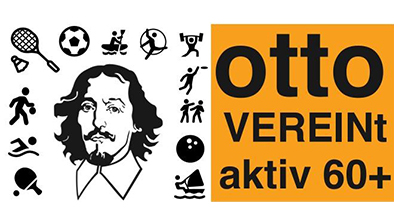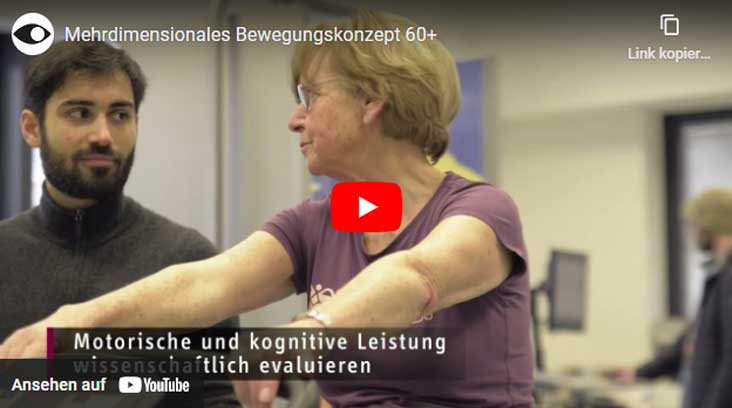Mehrdimensionales Bewegungskonzept 60+
 Welche Bedeutung hat Sport auf den Körper?
Welche Bedeutung hat Sport auf den Körper?
Auch im Seniorenalter sind regelmäßiger Sport oder körperliche Aktivität wichtig für Gesundheit und Lebensqualität. Die Todesfälle für Herz-Kreislauf-Erkrankungen im Jahr 2019 betrug 224.555 für die Altersgruppe zwischen 60 und 90 Jahren in Deutschland (statista). Zu den häufigsten beeinflussbaren Ursachen einer Herz-Kreislauf-Erkrankung zählen Übergewicht und Bewegungsmangel. Hauptaugenmerk dürfen jedoch nicht nur die physischen Aspekte sein. Gerade in der Coronazeit ist auch die Vereinsamung ein stetiges Problem. Die Otto-von-Guericke-Universität und das GKV-Bündnis für Gesundheit stellen sich dieser Problematik und wollen deshalb sportlich inaktive Senior*innen für ein körperlich aktives Leben begeistern. Denn durch gemeinsames Sporttreiben wird nicht das Risiko von Herz-Kreislauf-Erkrankungen, Diabetes, Demenz oder Depressionen gemindert, sondern auch das Miteinander wird gestärkt.
Mit dem neuen Bewegungsprogramm „Otto VEREINt aktiv 60+“ möchte Projektleiterin Prof. Dr. Kerstin Witte gemeinsam mit Ihren Projektmitarbeiter*innen, Anneke Schuhmacher, Marlene Krumpolt und David Rahil (Elternvertretung), Senior*innen wieder zum Sport heranführen. Das junge Team arbeiten an Fakultät für Humanwissenschaften der Otto-von-Guericke-Universität Magdeburg, am Institut III – Sportwissenschaft, Lehrstuhl für Sport und Technik/Bewegungswissenschaften, in dieser Einrichtung wird unter anderem das Bewegungsprogramm stattfinden.
Das Programm „ Otto vereint aktiv 60+“ soll alle ansprechen, die kurz vor dem oder bereits im Ruhestand sind und sich seit einigen Jahren nicht mehr sportlich betätigt haben. Das Angebot ist für alle Interessierte ist kostenlos und geht über einen Zeitraum von 6 Monaten.
Die Teilnehmer*innen treffen sich in festen Sportgruppen zweimal pro Woche für 90 Minuten in den Sporthallen der Universität, um gemeinsam unter professioneller Anleitung zu trainieren. Alle Teilnehmer*innen einer Gruppe starten in das Projekt zusammen ein. In enger Kooperation mit lokalen Vereinen aus Magdeburg wird ein breites Spektrum an unterschiedlichen Sportarten angeboten, somit bekommen die Senior*innen einen Eindruck von der Vielfalt des Sportes. Gerade Magdeburg als Sportstadt bietet zahlreiche Vereine an.
Es sind keine Vorkenntnisse sowie besondere Talente im Sport für diese Schnupperkurse erforderlich. Um die Neu- bzw. Wiedereinsteiger*innen an die sportliche Aktivität heranzuführen, sind die Einstiegsbarrieren sehr gering gesetzt - die Trainingsintensität wird dem konditionellen Leistungsstand der Teilnehmer*innen angepasst. Das Training teilt sich in zwei Bereiche auf. In der ersten Bewegungseinheit der Woche liegt der Fokus auf Koordination, Beweglichkeit und Ausdauer die mit Kräftigungsübungen sowie koordinativen Spielen ergänzt und kombiniert werden. Ebenfalls wird durch das Projekt die Thematik „ gesunde Ernährung“, durch eine zertifizierte Ökotrophologin, mit abgedeckt. Für die zweite Bewegungseinheit sind „Schnupperstunden“ in einzelnen Sportarten geplant, hier können die Teilnehmer*innen je nach Interesse die Bewegungsangebote wahrnehmen.
Viele lokale Sportvereine wirken tatenkräftig mit, so dass den Senior*innen ein breites Spektrum an sportlichen Aktivitäten angeboten wird. Die Teilnehmer*innen werden wissenschaftlich begleitet, indem untersucht wird, inwiefern sich körperliche und auch kognitive Fähigkeiten durch die sportliche Aktivität verändern und die Gesundheit positiv beeinflussen.
Bei allem sollen der Spaß und die Freude, miteinander aktiv zu sein, im Vordergrund stehen. Durch das Programm sollen die Teilnehmer*innen die Vorteile von sportlicher Aktivität durch sportartspezifische Bewegung kennenlernen. Unser Ziel ist es, dass die Teilnehmer*innen auch nach den 6 Monaten sportlich aktiv bleiben und sich dauerhaft für Sportarten oder regionale Sportvereine begeistern und dadurch das Herz-Kreislauf-System nachhaltig gestärkt wird und die motorischen, kognitiven und (psycho)-sozialen Fähigkeiten verbessert werden.
English version - Multidimensional movement concept 60+
The most common causes of non-communicable diseases that can be influenced, such as cardiovascular disease, include obesity and lack of physical acticity. However, the main focus should not only be on the physical aspects. Loneliness is also a constant problem, especially in the coronavirus era.
Otto von Guericke University and the "GKV Bündnis für Gesundheit" are tackling this problem and therefore want to inspire inactive senior citizens to lead a physically active life. After all, exercising together not only reduces the risk of cardiovascular disease, diabetes, dementia and depression, but also strengthens social interaction. With the new exercise program "Otto VEREINt aktiv 60+", project manager Prof. Dr. Kerstin Witte and her project team members, Anneke Schuhmacher, Marlene Krumpolt and David Rahil, want to reintroduce senior citizens to sport.
The young team works at the Faculty of Human Sciences at Otto von Guericke University Magdeburg, at Institute III - Sports Science, Chair of Sport and Technology/Movement Sciences, where the exercise program will take place, among other things. The "Otto vereint aktiv 60+" program is aimed at anyone who is about to retire or has already retired and has not been active for several years. The program is free of charge for anyone interested and runs for a period of 6 months. Participants meet in fixed sports groups twice a week for 90 minutes in the university's sports halls to train together under professional guidance. All participants in a group start the project together.
In close cooperation with local clubs from Magdeburg, a wide range of different sports are offered, giving the senior citizens an impression of the diversity of sport. Magdeburg in particular, as a city of sport, offers numerous clubs. No previous knowledge or special talents in sport are required for these taster courses. The entry barriers are set very low in order to introduce newcomers and those returning to sport - the intensity of the training is adapted to the fitness level of the participants. The training is divided into two areas. In the first movement unit of the week, the focus is on coordination, flexibility and endurance, which are supplemented and combined with strengthening exercises and coordinative games. The project also covers the topic of "healthy nutrition", which is taught by a certified ecotrophologist.
"Taster sessions" in individual sports are planned for the second exercise unit, where participants can take advantage of the exercise opportunities depending on their interests. Many local sports clubs are actively involved so that the senior citizens are offered a wide range of sporting activities. The participants are scientifically monitored by investigating the extent to which physical and cognitive abilities change as a result of the sporting activity and have a positive impact on health. The focus is always on having fun and enjoying being active together. Through the program, participants should learn about the benefits of sporting activity through sport-specific exercise. Our aim is for the participants to remain active after the 6 months and to become permanently enthusiastic about sports or regional sports clubs, thereby strengthening the cardiovascular system in the long term and improving motor, cognitive and (psycho)social skills.

